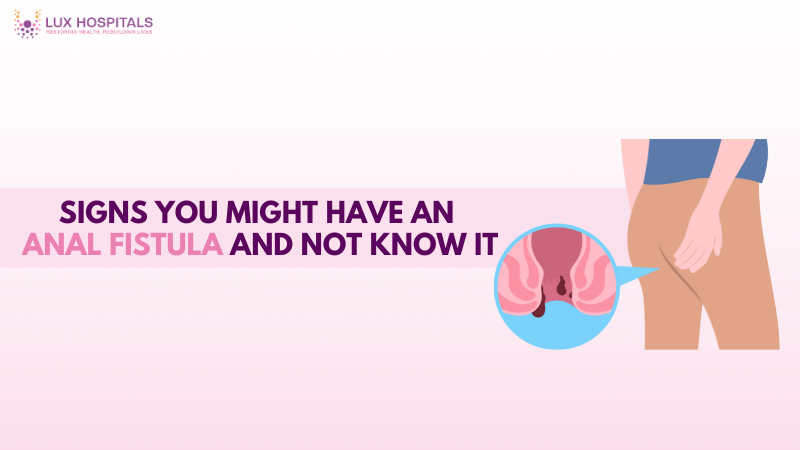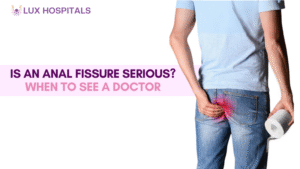Signs You Might Have an Anal Fistula and Not Know It

Anal fistula is a small tunnel-like connection between the inside of the anus and the skin around it, often caused by an infection or abscess. While it may seem like a minor issue at first, leaving it untreated can lead to significant discomfort and complications. Many people do not even realize they have an anal fistula until symptoms become severe. Understanding the signs early can help you seek medical care before the condition worsens. The key will be explained in this post. signs of an anal fistula, what causes it, and why it’s essential to get timely treatment.
What Is an Anal Fistula?
An anal fistula usually develops when an anal gland develops an abscess after becoming infected, which then creates a tract leading to the skin surface. It may cause continuous or intermittent drainage of pus, discomfort, and sometimes bleeding. This condition can occur due to chronic infections, inflammatory bowel disease, trauma, or previous surgeries. Anal fistulas, in contrast to transient skin infections, usually necessitate medical or surgical intervention because they do not heal on their own.
Common Signs You Might Have an Anal Fistula
Recognizing the signs of an anal fistula is crucial for early treatment. These are some symptoms to be aware of.
1. Persistent Pain Around the Anus
A severe, throbbing pain around the anus is one of the most typical symptoms of an anal fistula. When you sit, move, or have bowel movements, this pain might get worse. Sometimes the discomfort doesn’t go away even while you’re at rest, which means there’s an infection or inflammation going on.
2. Swelling or a Lump Near the Anus
An underlying anal fistula may be the cause of any bulge or lump you observe around the anus. An infection may be indicated by this swelling, which frequently feels sensitive to the touch and may be accompanied by warmth or redness. Sometimes the tumor will spontaneously drain blood or pus.
3. Discharge of Pus or Blood
The drainage of pus, blood, or both from the orifice close to the anus is a clear indication of an anal fistula. The discharge may leave stains on undergarments and frequently has an unpleasant smell. Constant drainage may necessitate frequent cleaning and make personal hygiene difficult.
4. Recurrent Anal Abscesses
The drainage of pus, blood, or both from the orifice close to the anus is a clear indication of an anal fistula. The discharge may leave stains on undergarments and frequently has an unpleasant smell. Constant drainage may necessitate frequent cleaning and make personal hygiene difficult.
5. Fever and General Discomfort
Systemic symptoms, including fever, chills, and exhaustion, can occasionally be brought on by anal fistulas. These happen when the illness gets worse or spreads, which means you need to see a doctor at once. Ignoring these indicators may result in more significant problems.
What Causes an Anal Fistula?
Several factors can lead to the development of an anal fistula:
- Anal abscesses – The most common cause; untreated abscesses can form a fistula.
- Crohn’s disease—Inflammatory bowel conditions increase the risk of fistula formation.
- Infections—Chronic infections in the anal region can cause tissue breakdown.
- Trauma or surgery—Past injuries or surgical procedures in the anal area may lead to fistula formation.
- Tuberculosis or cancer – Rarely, systemic diseases can also contribute to anal fistula development.
Understanding the cause helps doctors plan appropriate treatment and prevent recurrence.
Why Is It Important to Treat an Anal Fistula Early?
An untreated anal fistula can lead to chronic pain, recurrent infections, and severe abscesses. Sometimes the infection spreads farther, leading to consequences that necessitate major surgery. Improving recovery results and preventing additional harm are two benefits of early diagnosis and treatment. Most treatments involve minor surgery, but modern techniques ensure minimal discomfort and quick healing. If left ignored, the illness could get worse and have an impact on your overall quality of life.
Diagnosis and Treatment Options for Anal Fistula
Let’s say you think you may have an anal fistula. In order to evaluate the situation, a physician will perform a physical examination and might prescribe imaging tests like an MRI or ultrasound.
Treatment options include:
- Fistulotomy—A surgical procedure to open and clean the fistula.
- Seton placement—A medical thread is used to drain and promote healing.
- Advanced procedures—Techniques like fibrin glue, plugs, or laser therapy may be recommended for complex cases.
Early intervention helps prevent recurrence and improves healing time.
Living with an Anal Fistula: Tips for Relief
Maintaining proper hygiene, using sitz baths for comfort, and closely adhering to your doctor’s recommendations are all important aspects of managing an anal fistula both before and after treatment.
- Maintain cleanliness to prevent further infection.
- Eat a high-fiber diet to ease bowel movements and reduce strain.
- Follow up regularly with your healthcare provider for ongoing assessment.
Taking these steps can help improve comfort and speed up recovery.
Conclusion
Although an anal fistula might appear to be a small concern, if treatment is not received, it can lead to long-term issues. You can seek medical attention before difficulties emerge by being aware of the warning signals, which include pain, swelling, drainage, or recurrent abscesses. Systemic symptoms, including fever, chills, and exhaustion, can occasionally be brought on by anal fistulas. These happen when the illness gets worse or spreads, which means you need to see a doctor very often. Ignoring these indicators may result in more significant problems.
Frequently Asked Questions
The first signs of an anal fistula often include pain around the anus, swelling, and discharge of pus or blood. You may also notice irritation or a foul-smelling discharge from the opening. If left untreated, abscesses may recur frequently.
Most anal fistulas do not heal on their own and require medical or surgical treatment. While antibiotics may help control infection temporarily, they do not close the fistula tract. Surgery is often the most effective way to ensure complete healing.
Although rarely fatal, an anal fistula can result in severe pain, discomfort, and infections if treatment is not received. Your everyday life and general health may also be impacted by recurrent abscesses. Early intervention lowers these risks.
While most anal fistulas are caused by infections or inflammatory conditions, in rare cases, chronic fistulas may be linked to cancer. If symptoms persist or worsen, it’s essential to get evaluated by a specialist.
Doctors usually diagnose an anal fistula through a physical assessment and could employ imaging tests such as MRI or ultrasound. a physical assessment and could employ imaging tests such as




















